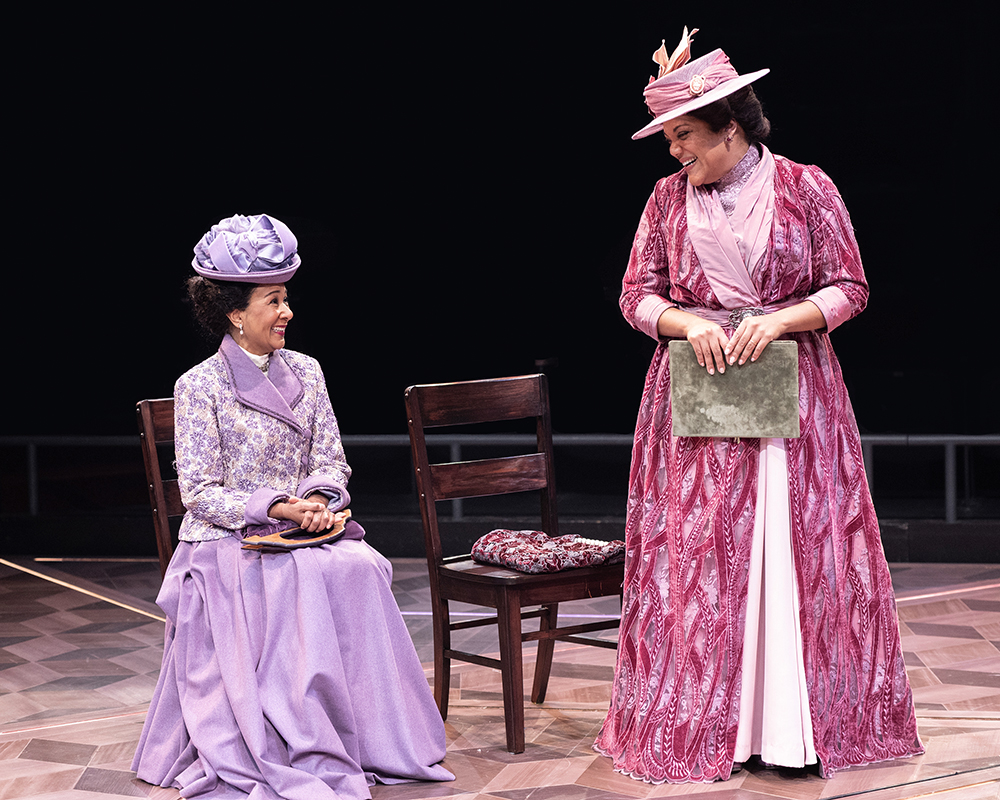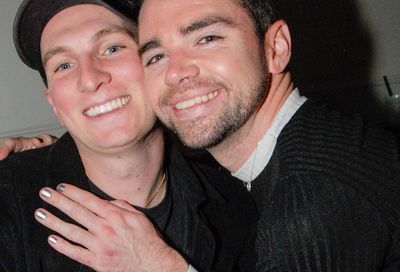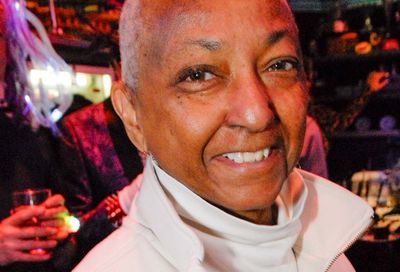Progressive Playwright: Robert Schenkkan
"All the Way" scribe Robert Schenkkan is convinced that progress in LGBT rights is inevitable

Robert Schenkkan is disturbed by what transpired in his birth state of North Carolina just before Easter, when legislators rammed through a law banning local anti-discrimination ordinances.
“Slipping in a sidebar that also prohibits local communities from raising the minimum wage?” the Pulitzer Prize- and Tony-winning playwright says. “What’s that have to do with protecting that poor high school girl from being exposed to a rapist in a bathroom? I think they know in their hearts this is all bullshit. That it’s wrong. That it’s reprehensible. And that’s why they did it the way they did it, in the dark of night.”
As disturbed as he is by the anti-gay antics in North Carolina and other Republican-helmed states, Schenkkan is hardly disillusioned. He’s confident such bills will be rolled back due to public opposition, or at the least ruled illegal and overturned by the courts. Ultimately he’s convinced that progress, in LGBT rights as with other social issues, is inevitable.
That’s an outlook colored by the 63-year-old’s extensive focus on the Civil Rights Movement, in particular the work of President Lyndon Baines Johnson 50 years ago. Schenkkan, who won a Pulitzer Prize for his 1992 drama The Kentucky Cycle, most recently finished work on The Great Society, a follow-up to All the Way, his first examination of the LBJ Administration. All the Way won the Tony Award for Best Play in 2014, and in a few weeks will make its Washington theater debut at Arena Stage — starring Jack Willis, who originated the role of LBJ at the Oregon Shakespeare Festival — as well as get the HBO film treatment, starring Bryan Cranston, who also played the role on Broadway. All the Way focuses on the emotional and intense 11 months between John F. Kennedy’s assassination and Johnson’s election in 1964.
“I would like to think that the political cycle we entered then we are just now emerging from,” he says. “Convulsively, bloodily, but that we might be finally moving forward.” Yet Schenkkan is not naive to the ways of progress. He knows that obstacles are as inevitable as they are unpredictable, as opponents steadily move forward.
METRO WEEKLY: I understand you have a personal connection to Lyndon Baines Johnson, which inspired All the Way.
ROBERT SCHENKKAN: I grew up in Austin, the heart of Hill Country. It’s very close to Johnson City, where LBJ grew up and where his ranch eventually was — the Western White House. And my father knew him in a very, very small but important way for us. My father was a pioneer in public television and radio, and he had been hired by the University of Texas to come down and set up the first public television and radio station in the Southwest. And his first job was to get permission from then-Senator Johnson, because it would have been a direct competitor with his own media empire. So he did meet with the Senator. And Johnson not only gave his permission but of course he would go on to sign into law the bill that created public television and radio in this country as we know it. So growing up, he was a good man in our house.
I remember vividly the Johnson/Goldwater campaign of ’64. It was my first really conscious presidential election. And we were thrilled when he won. A year and a half later, troop levels in Vietnam had gone up from 25,000 to 170,000 and I felt differently about him. Several years later, as an artist, a man trying to make a go of it, I became increasingly aware of the programs that were helpful to me, the legacy of his domestic agenda, the so-called Great Society, and I had yet a different feeling about him.
MW: When you put together All the Way, where you thinking you would also write a sequel, The Great Society?
SCHENKKAN: Yes. The challenge was that there’s so much great material here. What do you want to write about? I could easily have written a really interesting play about his first campaign for the House of Representatives in Texas — as sort of the young politician discovering himself. Or I could have written a play about his first Senate campaign, which was stolen from him in the final moments of the election with a handful of fake votes. Or I could have written about his second Senate campaign, the one he stole in the last moments with a handful of fake votes. Instead I settled on the first term of the so-called Accidental President. It was always in my mind to finish the story of his presidency with The Great Society.

MW: How does this fit in with today’s politics?
SCHENKKAN: It’s shockingly contemporary. That’s how it feels. The situational politics of 1964, uber-conservative wing of the Republican Party in the ascendancy. The Republican Party was in extreme disarray, very fractured. And we’re seeing something very similar to that today. Race played an enormous role in the 1964 election, and race continues to play an enormous role in American life. In fact all of the things that we argue about today — race, Medicare, immigration, foreign policy — all of these things had their genesis in 1964. Obviously it’s a very fraught time. But it feels shockingly familiar in so many ways.
MW: Certainly this year’s election cycle seems to be shaping up in unexpected and unpredictable ways.
SCHENKKAN: Well, I certainly didn’t project that Trump would last as long as he has, or would be the Republican candidate. I’m surprised at that, on the one hand. On the other hand, there’s certainly reason why that is. It’s not irrational. One can understand the forces at work and how he’s exploited them, and the unique confluence of personalities and forces right now so that it makes sense in a certain kind of way, but I would never have predicted this precise outcome. Nor would I have predicted Bernie Sanders’s popularity, necessarily.
MW: Hillary Clinton was a given.
SCHENKKAN: Hillary was a given, and I thought that Rubio — not who I was rooting for by any means — but I thought he would be the candidate for the Republican party.
MW: You didn’t think Jeb Bush?
SCHENKKAN: I didn’t think Jeb would last. Certainly he was the front runner. But the more you saw, the less there was to love. It just didn’t seem to be happening. And from a political standpoint, regardless of what one thinks of Rubio’s actual politics and ideology, he seemed the most presentable candidate that the Republicans could field in 2016. And the one who would be, in my opinion, the most challenging face. Apparently not. [Laughs.]
MW: How much are you following the religious freedom bills being passed in state legislatures, from Indiana to North Carolina — which seem to be a backlash to the progress made in LGBT rights in recent years, most notably with marriage equality?
SCHENKKAN: There’s no question that’s a backlash. There always is, there always is. Whenever progress gets made, there is a reaction, an attempt to push back. It’s always three steps forward, two steps back. So one could certainly have predicted this. It’s unfortunate — the case in North Carolina, the way in which it happened is unconscionable. But yes, there’s going to be a lot of pushback on all these areas. Every time we move the ball a little further down the field — towards a more diverse, more just, more non-racist society, we’re threatening people. We’re threatening their privilege, we’re threatening their power, we’re threatening their world. And they’re going to respond. We just have to out-lobby and out-move and out-vote them.
MW: We should talk about the gay aspects in All the Way. There’s the work of Hoover, for one. The era has been referred to by some as “the Lavender Scare.”
SCHENKKAN: Yes, 1964 was not a good time to be a gay man or woman in the United States. J. Edgar Hoover, America’s most famous closeted self-hating homosexual, is a significant figure, and we see him actually blackmail Joseph Alsop, who had tried to keep his homosexuality very much on the downlow. Hoover had acquired photographic proof about an assignation in Moscow, and used that against Alsop, manipulating or forcing him to publish columns critical of Dr. King. And then, of course, most famously Walter Jenkins, who was LBJ’s Chief of Staff and private secretary, and had been with him from the very beginning, was caught by the D.C. Vice Squad in a men’s room at a YMCA having sex. LBJ dropped him immediately. He cut him completely out of his circle.
I don’t think it was so much that LBJ disapproved of homosexuality or whatever, but the charge often levied then was that homosexuals in government would be more susceptible to blackmail and were a security concern. And he was very worried about being flanked by Goldwater on this issue. And so he dropped one of his oldest, closest friends like a hot potato. And Jenkins went back to Austin. LBJ did not see him again until he left office. At which point there was a reconciliation, although I understand that Walter Jenkins’s wife, who never believed that Walter was gay, never really quite forgave LBJ for his treatment. So what we see is how men and women in this time period were forced to hide their sexuality, and the baleful consequences of that, personally and nationally, in terms of what that meant to people. It’s a sobering reminder of what America was like not that long ago.
MW: You remain interested and engaged in politics. After all these decades of slow progress and lots of history repeating itself, I wonder, how do you keep from getting disillusioned?
SCHENKKAN: Well, like everybody, I have those dark moments of the soul. But one of the positive things about occasionally working with historic material is the awareness of the arc of time, and how these things play out over time. And that progress, while it might in the short-term seem impossible, in the longer frame of history is inevitable. And there’s a lot of comfort to be had there, with the thought that, “Yes, this situation is not tenable right now. It’s not what I want it to be, but it can be changed.” And of course the requirement there is that as citizens we all put our shoulders to the wheel and actually get involved. If you leave it to others, then you will get the government you deserve. So that’s how I stay positive. There are so many smart, talented people out there doing good work, some of it is nationally recognized, some of it is small and community-oriented, but people are out there engaged, they’re working hard.
I think this younger generation gives us a lot of hope in many ways. They’re a more diverse generation, they’re much more comfortable with gender orientation and sexual preference and race than their parents were, and certainly than their grandparents were. There’s still so much work to be done, but I think there’s reason to be hopeful. Even though things like North Carolina happened, you’ve got to man up and get in there. The reason they were able to do that is because they, the Republicans, occupy both those houses and the governor’s office. You don’t want that to happen? Then you need to get out your vote, and you need to make sure that they aren’t able to exercise unilateral power like that. That’s the lesson there.
MW: It can be hard to motivate people until something like that happens.
SCHENKKAN: Well, it can be. But I was very heartened, for example, by the immediate response by several major corporations, who immediately said, this is bullshit and we’re not going to do business with the state of North Carolina. That’s Walt Disney. That’s the NFL. That’s the NBA. Take away basketball from North Carolina — those people freak out. And nobody had to go bang on their door to ask them to do that. They responded immediately from corporate headquarters. That’s a huge difference than what you would have seen 10 years ago. And that’s very positive.
I think those representatives in North Carolina, I think they know in their hearts this is bullshit. That it’s wrong. That it’s reprehensible. And that’s why they did it the way they did it, in the dark of night.
It’s a horrible thing, and the temptation is all too easy to sort of throw up your hands. But if we make a little progress, it doesn’t mean that everybody is all hearts and flowers. That’s not the way it works. It takes a long time to turn around a nation. I remind people that the current president of the United States — fifty years ago, his parents would have been guilty of a Class C felony in Georgia. They could have been sentenced to seven years in prison. The parents of the sitting president of the United States. That’s fifty years ago. You think about how shocking that is. That interracial marriage would be treated like that, and how much further we are along today. As Dr. King says, the moral arc of the universe bends toward justice, but very slowly.
Arena Stage presents the D.C. premiere of Robert Schenkkan’s All the Way now to May 8 at the Mead Center for American Theater, 1101 6th St. SW. Tickets are $40 to $90. Call 202-488-3300 or visit arenastage.org.
Support Metro Weekly’s Journalism
These are challenging times for news organizations. And yet it’s crucial we stay active and provide vital resources and information to both our local readers and the world. So won’t you please take a moment and consider supporting Metro Weekly with a membership? For as little as $5 a month, you can help ensure Metro Weekly magazine and MetroWeekly.com remain free, viable resources as we provide the best, most diverse, culturally-resonant LGBTQ coverage in both the D.C. region and around the world. Memberships come with exclusive perks and discounts, your own personal digital delivery of each week’s magazine (and an archive), access to our Member's Lounge when it launches this fall, and exclusive members-only items like Metro Weekly Membership Mugs and Tote Bags! Check out all our membership levels here and please join us today!
























